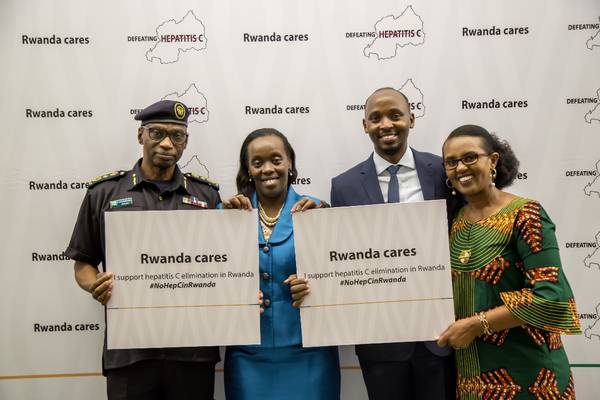In the continued fight toward the elimination of the Hepatitis C Virus (HCV), Rwanda has become the first country in sub-Saharan Africa to propose a plan with the commitment of ending the virus through initiatives including community awareness, affordability of screenings and treatment, and international partners solidarity.
In collaboration with the Ministry of Health, the Private Sector Federation (PSF) and the Rwanda Inter-Religious Council (RIC) the “Rwanda Cares” event, held at the Kigali Convention Centre on July 31st, marked the Ministry of Health’s ongoing efforts in garnering support to decrease prevalence rates and eventually eliminating HCV.
According to a recent report from the WHO, nearly 71 million people globally are currently living without HCV treatment. Currently, the virus is prevalent among 4-8% of Rwandans.
The a 5-year HCV elimination plan was proposed to target and screen around 4 million people aged 15 and above, to confirm with viral load test of 230,000 people expected to be HCV antibody positive, and to treat 112,000 patients expected to be chronically HCV positive. The overall aim of this initiative is to decrease HCV prevalence from 4.0% to 1.2% and achieve 90% treatment coverage of all people aged 15 and above by 2024.
The plan will focus on implementing more effective and affordable care and treatment, as well as innovative models of service delivery of affected populations through community awareness, increased screening at primary healthcare facilities, and training healthcare providers. Thus far about 1,000,000 Rwandans have already been screened and 15,000 have been treated and cured. In addition, treatment costs have been reduced from $80,000 USD to $60 USD, and screening costs have been reduced from $30 USD to $1 USD.
Guest of honor, First Lady of Rwanda Jeannette Kagame, commended the Government of Rwanda for not losing hope in the face of rising treatment and medication costs. She also empowered Rwandan communities to strive to live healthier lives and explained that, “the elimination of Hepatitis C is a fight that we are yet to claim victory over, but it is one that we can successfully accomplish, with the continued partnership of stakeholders, from the public to the private spheres”.
Hepatitis is a liver disease, often leading to liver cancer or cirrhosis in the chronic stage. HCV is classified as both an acute and chronic infection, and often symptoms may not present until the chronic stage. The disease is a bloodborne infection and spreadable through exposure to small amounts of blood and transmittable through drug injection use, transfusion of unscreened blood or blood products, and sex. Currently, there is no vaccine for HCV.
